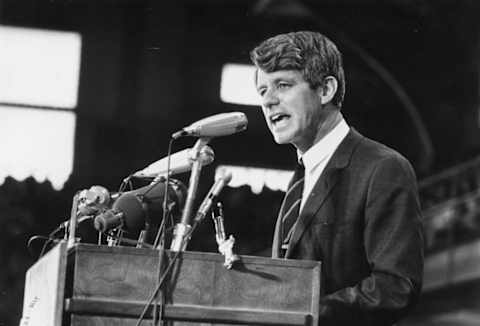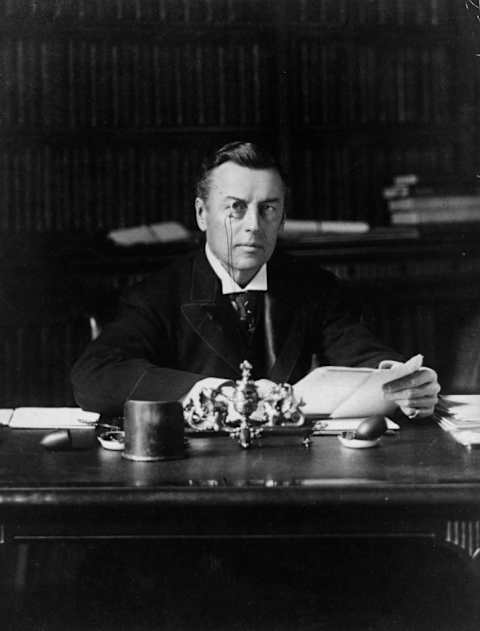
At first it is easy to think that the phrase may you live in interesting times is a form of wishing someone well. After all, interesting times are better than boring times, right?
But they are actually the most fascinating periods to look back on history are usually not very pleasant. Stories of war, conquest, famine, corruption and other terrible events tend to dominate the history books. As compelling as these events can be in retrospect, the average person who experiences such difficult times generally experiences a great deal of fear and hardship.
For this reason may you live in interesting times It is said to be more of a curse than any kind of warm tidings – not a mystical kind of hex, but still a way to wish harm on someone. Find out more about its fascinating (albeit obscure) origins below commonly used phrase.
- How RFK popularized the phrase
- Who used the phrase first?
How RFK popularized the phrase
One of the most famous uses of the phrase was in Robert F. Kennedys Confirmation day addresswhich took place in June 1966 at the University of Cape Town.
In what has since been “Ripple of hopeDuring his speech, Kennedy drew parallels between the struggle against apartheid in South Africa and the American civil rights movement, emphasizing that turbulent times often pursue greater ideals of equality. RFK attributed a certain saying to an old Chinese proverb:
“There is a Chinese curse that says, ‘May he live in interesting times.’ Like it or not, we live in interesting times. These are times of danger and uncertainty; but they are also the most creative of all time in human history.”
 Bobby gets a lot of credit. / Harry Benson/GettyImages
Bobby gets a lot of credit. / Harry Benson/GettyImages
As the ‘Ripple of Hope’ speech gained traction worldwide, it helped popularize the phrase, especially among intelligentsia types such as Albert Camus and Hillary Rodham Clinton, who went on to use it more widely.
For motivational purposesthe quote certainly does. But RFK’s speechwriter was wrong about one thing: such a curse or proverb doesn’t actually exist in Chinese. A Chinese phrase similar to RFK’s quote appears in the 1627 short story collection Stories to wake up the world. The book’s anti-war message is palpable in the sentence (寧為太平犬, 不做亂世人or níng wéi tàipíng quǎn, bù zuò luànshì rén in Simplified Chinese), which means: “It is better to be a dog in a peaceful time than a man in a chaotic time.”
Who used the phrase first?
While it is true that the basic idea of may you live in interesting times might have been borrowed from an ancient Chinese proverb, this doesn’t fully explain how the phrase turned into a “curse,” especially with the concept of “interesting” times as opposed to simply chaotic times. Probably the classic version of this saying – at least as Americans know it – is due to: wrong translation (or misunderstanding) dating back to early 20th century British diplomats.
Particularly in 1936, the expression suddenly saw the rise of the British diplomatic corps. In the memoirs Diplomat in peace and war, Sir Hughe Knatchbull-Hugessen, a British ambassador to China, recalls a conversation about this: ‘Before I left England for China in 1936, a friend told me that there is a Chinese curse: ‘May you live in interesting times.’ If so, then our generation has certainly witnessed the fulfillment of that curse.”
That same year, Frederic R. Coudert, honorary vice president of the American Society of International Law, said: letters exchanged with diplomat Sir Austen Chamberlain, an old friend and brother of Neville Chamberlainwho became British Prime Minister in 1937. Coudert concluded a letter to Sir Austen with a passing comment about how they “lived in an interesting age.”
According to Coudert, Chamberlain wrote back: “I learned from one of our diplomats in China that one of the most important Chinese curses uttered on an enemy is, ‘May you live in an interesting age.’” Chamberlain also reportedly claimed that “No era has been as full of uncertainty as our current time.”
 Don’t blame Neville; his father, Joseph, was probably the real culprit. / General photo agency/GettyImages
Don’t blame Neville; his father, Joseph, was probably the real culprit. / General photo agency/GettyImages
It’s been since then theorized that the Chamberlain family not only spread the new phrase, but were also responsible for its exact wording. Austen and Neville’s father, Joseph Chamberlainwas a politician himself and used the specific phrase we live in interesting times in a few speeches around 1898 to 1901, so his sons would probably have known.
Although it is entirely possible that the phrase emerged from a conversation between Sir Austen and another diplomat in China (who may have been the concept behind it is better to be a dog in a quiet time) it is likely that racist attitudes towards China played a large role in why the country was seen as something of a hex.
It’s not a Chinese curse at all. But attributing the phrase to “ancient Chinese wisdom” probably made it feel more mystical – and therefore more memorable – to mid-century onlookers who read or overheard it. This mysterious appeal would have made it seemingly perfect fodder for speeches – even if it was probably more of a British-made idiom than a British-made idiom. Chinese eventually.
Read more about the origins of the phrase below:
manually
Leave a Reply